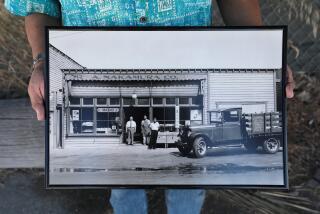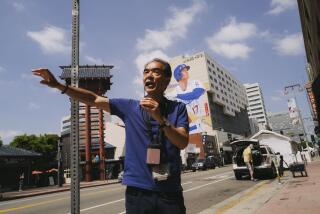Protesters Travel 6,000 Miles to Fight Eviction : Activism: The Koreans were told to leave land in Japan after Nissan sold the parcel to a developer. The colony, which began with laborers conscripted during World War II, appeals to car maker’s U.S. arm to help.
- Share via
A 67-year-old resident of Utoro, a tiny enclave of Koreans in Japan, brought the battle to save his community to Los Angeles on Wednesday, seeking to deliver petitions with nearly 20,000 signatures to officials at Nissan Motor Corp. USA in Carson.
Utoro’s 380 residents--survivors, spouses and descendants of a group of Korean laborers conscripted during World War II--are concentrating their fight against eviction on Nissan because they believe the Japanese conglomerate has a historic duty to the villagers.
After two hours of circling in front of the locked front entrance to the Nissan headquarters, So-Do Kim, his Utoro delegation and their 60 Los Angeles supporters chose to keep the petitions because Nissan would permit only one representative to come inside.
“We are disappointed, angry and frustrated at the way we’ve been treated,” said Akiko Tagawa, a member of the Utoro delegation.
“It’s unconscionable that Nissan officials would refuse to receive people who spent their life’s savings to travel 6,000 miles to present the petitions,” said Paul S. Lee, coordinator of the newly formed Committee to Support Utoro. Nissan’s “arrogance displayed today” is typical of what Koreans and other minorities have had to endure in Japan, he said.
Lee said his group will send the five large boxes containing the petitions directly to Nissan Shatai Co., a Nissan subsidiary in Japan.
Steve Spurgeon, a spokesman for Nissan Motor Corp. USA, said the company “would have been happy to receive the petitions.” On Tuesday he had sent a fax to Lee informing him that only one representative would be escorted inside to leave the petitions and that the material would be forwarded to Nishi Nihon Shokusan in Japan, Spurgeon said. Nishi Nihon Shokusan is the real estate development company that holds title to the land on which the villagers live. The land was formerly owned by Nissan Shatai.
“The claims of the people of Utoro are in review in the Japanese legal system,” Spurgeon said. “Neither Nissan Motor Corp. USA nor Nissan North America is involved in the suit.”
This afternoon, the Utoro delegation and their supporters are scheduled to demonstrate in front of the Japanese Consulate in Downtown Los Angeles. On Friday, they are to fly to San Francisco to meet with supporters in Northern California and hold a protest rally. They will return to Los Angeles on Saturday to picket an undisclosed Nissan dealership.
Since the plight of Utoro residents was publicized last month in Los Angeles, the villagers have attracted supporters from Los Angeles’ Korean, Japanese, Filipino and African-American communities.
The Utoro residents have been trying to win outside help in fending off an attempt to evict them because they feel they do not have a chance in Japan. They acknowledge that they have no legal title to the land, which was sold to a developer in 1987. But they say the Japanese government, which drafted Korean workers, and the company that employed them to help build Japan’s war machine, have a moral obligation to help them.
“But for Japan’s imperialistic policies, which forcibly took Korea and ruled it for nearly 36 years, people of Utoro wouldn’t be there,” said Kim, speaking in Japanese and Korean. “When the war was over, they just left us there with no salary or provisions.”
The Korean laborers stayed on, eking out a living by collecting and selling scrap and built their own community.
For more than 40 years, they led impoverished but relatively peaceful lives in their ramshackle neighborhood about 15 miles southeast of the ancient Japanese capital of Kyoto. A company related to Nissan Motor Co. had acquired the land from the Japanese government after the war but the villagers were left alone.
Villagers said that in 1987, Nissan Shatai Co., the subsidiary, sold the five acres on which they lived for $5 million without telling them. A year later, Nishi Nihon Shokusan, the developer that bought the land, served eviction notices. The developer dispatched trucks and demolition crew to Utoro in February, 1989, but Utoro residents formed a human wall to guard their homes.
*
Kim, who works as a general secretary of the Korean Residents Assn., said his village’s 80 households have been collecting $50 each month to finance the trip to the United States.
“We wanted to come to first thank our supporters and secondly to ask Americans to remember us after we’ve returned home,” he said.
Tagawa, a founding member of the Assn. to Protect Utoro who is Japanese, said their campaign is not a movement to “bash Japan but to help make Japan become a better country.
“As a Japanese citizen, I am ashamed of what Japan and Nissan have done. But if we can use the Utoro case as an opportunity to admit our errors and do the right thing from now on, Japan and Nissan will attain true international stature,” Tagawa said. “If Nissan can donate $5 million to help rebuild Los Angeles, it can surely do the same thing to compensate people who helped Nissan become rich.”
The Rev. F. Raymond Johnson, of the Faith Ful-Central Baptist Church in South-Central Los Angeles, said he joined the movement to help the people of Utoro because “as an African-American, I know only too well what injustice, discrimination and slavery mean.”
Johnson, representing the African/Korean American Christian Alliance, an organization made up of African-American and Korean-American ministers in Los Angeles, said his group unanimously voted last month to ask the Japanese government to consider “just compensation” to the Korean laborers of Utoro.
“Through negotiations with the government of Japan and the 80 families, Nissan Motor Company and its developer should recognize the Utoro families’ equitable interests in the land, and refrain from attempting to evict the families to develop the five-acre property,” Johnson said.
As the group prepared to leave the Nissan facility, Kim was overcome with emotion.
“Before I came, I never realized so many people in America cared about such a small village in Japan,” Kim said, his eyes welling with tears. “These wonderful people have given us strength, encouragement and hope to continue the battle. We are not alone anymore.”






